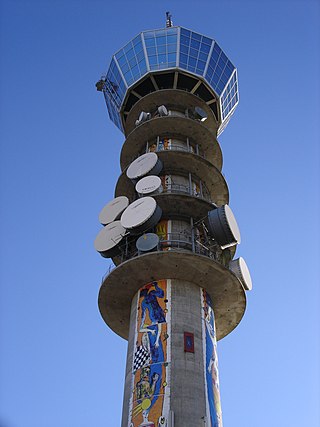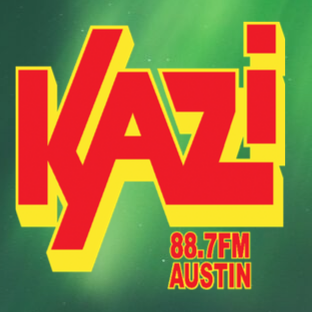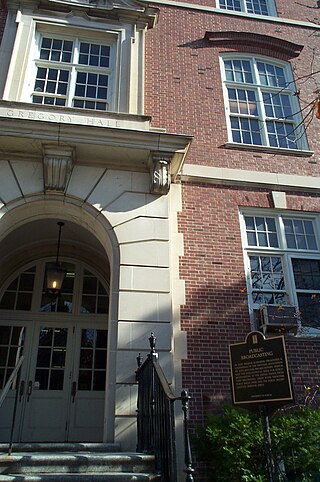
A copyright is a type of intellectual property that gives its owner the exclusive legal right to copy, distribute, adapt, display, and perform a creative work, usually for a limited time. The creative work may be in a literary, artistic, educational, or musical form. Copyright is intended to protect the original expression of an idea in the form of a creative work, but not the idea itself. A copyright is subject to limitations based on public interest considerations, such as the fair use doctrine in the United States and fair dealings doctrine in the United Kingdom.
Music radio is a radio format in which music is the main broadcast content. After television replaced old time radio's dramatic content, music formats became dominant in many countries. Radio drama and comedy continue, often on public radio.
Creative Commons (CC) is an American non-profit organization and international network devoted to educational access and expanding the range of creative works available for others to build upon legally and to share. The organization has released several copyright licenses, known as Creative Commons licenses, free of charge to the public. These licenses allow authors of creative works to communicate which rights they reserve and which rights they waive for the benefit of recipients or other creators. An easy-to-understand one-page explanation of rights, with associated visual symbols, explains the specifics of each Creative Commons license. Content owners still maintain their copyright, but Creative Commons licenses give standard releases that replace the individual negotiations for specific rights between copyright owner (licensor) and licensee, that are necessary under an "all rights reserved" copyright management.

Radio broadcasting is the broadcasting of audio (sound), sometimes with related metadata, by radio waves to radio receivers belonging to a public audience. In terrestrial radio broadcasting the radio waves are broadcast by a land-based radio station, while in satellite radio the radio waves are broadcast by a satellite in Earth orbit. To receive the content the listener must have a broadcast radio receiver (radio). Stations are often affiliated with a radio network that provides content in a common radio format, either in broadcast syndication or simulcast, or both. The encoding of a radio broadcast depends on whether it uses an analog or digital signal. Analog radio broadcasts use one of two types of radio wave modulation: amplitude modulation for AM radio, or frequency modulation for FM radio. Newer, digital radio stations transmit in several different digital audio standards, such as DAB, HD radio, or DRM.
Public broadcasting involves radio, television, and other electronic media outlets whose primary mission is public service. Public broadcasters receive funding from diverse sources including license fees, individual contributions, public financing, and commercial financing, and claim to avoid both political interference and commercial influence.

National Educational Television (NET) was an American educational broadcast television network owned by the Ford Foundation and later co-owned by the Corporation for Public Broadcasting. It operated from May 16, 1954, to October 4, 1970, and was succeeded by the Public Broadcasting Service (PBS), which has memberships with many television stations that were formerly part of NET.

A Creative Commons (CC) license is one of several public copyright licenses that enable the free distribution of an otherwise copyrighted "work". A CC license is used when an author wants to give other people the right to share, use, and build upon a work that the author has created. CC provides an author flexibility and protects the people who use or redistribute an author's work from concerns of copyright infringement as long as they abide by the conditions that are specified in the license by which the author distributes the work.
A non-commercial educational station is a radio station or television station that does not accept on-air advertisements, as defined in the United States by the Federal Communications Commission (FCC) and was originally intended to offer educational programming as part, or whole, of its programming. NCE stations do not pay broadcast license fees for their non-profit uses of the radio spectrum. Stations which are almost always operated as NCE include public broadcasting, community radio, and college radio, as well as many religious broadcasting stations. Nearly all non-commercial radio stations derive their support from listener support, grants and endowments, such as the Corporation for Public Broadcasting (CPB) that distributes supporting funds provided by Congress to support public radio.

The Public Broadcasting Act of 1967 issued the congressional corporate charter for the Corporation for Public Broadcasting (CPB), a private nonprofit corporation funded by taxpayers to disburse grants to public broadcasters in the United States, and eventually established the Public Broadcasting Service (PBS) and National Public Radio (NPR). The act was supported by many prominent Americans, including Fred Rogers, NPR founder and creator of All Things Considered Robert Conley, and Senator John O. Pastore of Rhode Island, then chairman of the Senate Subcommittee on Communications, during House and United States Senate hearings in 1967.

KSUA is a student-run college radio station licensed to Fairbanks, Alaska. Broadcasting from the University of Alaska Fairbanks (UAF) campus with 3,000 watts effective radiated power (ERP,) it serves the Alaska Interior area. When first on the air in 1984, it was one of a few commercially licensed college stations. Reorganized in 1993, KSUA now operates under the FCC non-commercial educational license public radio rules.
KSYS is a PBS member station in Medford, Oregon, United States, owned by Southern Oregon Public Television. The station's studios are located on South Fir Street in downtown Medford and its transmitter is located in King Mountain.

KAZI is a listener-supported, non-commercial community radio station in Austin, Texas, United States. The transmitter site is located in Southwest Austin and the station has studios in Northeast Austin. It is owned by Austin Community Radio, Inc., a Texas non-profit entity founded April 22, 1975.

Wikivoyage is a free web-based travel guide for travel destinations and travel topics written by volunteer authors. It is a sister project of Wikipedia and supported and hosted by the same non-profit Wikimedia Foundation (WMF). Wikivoyage has been called the "Wikipedia of travel guides".

Intercollegiate Broadcasting System (IBS) is an organization with a membership of over one thousand non-profit, education-affiliated radio stations and webcasters. Founded in 1940, IBS is headquartered in New Windsor, New York, with a legal office in Washington, D.C. In addition to providing support for establishing and operating noncommercial radio and webcast operations, it frequently represents its members with FCC negotiations, copyright issues, and litigation.

WKEU-FM 88.9 is an FM radio station broadcasting a classic hits format. Its city of license is The Rock, Georgia, United States. The station is owned by Georgia Public Radio, Inc., and also features radio programming from ABC Radio. Having an original airdate in 1999, it is the sister station of WKEU AM 1450, in nearby Griffin, Georgia. The broadcast callsign was previously on 97.5 in Fayetteville, Georgia, also nearby.

Free content, libre content, libre information, or free information is any kind of creative work, such as a work of art, a book, a software program, or any other creative content for which there are very minimal copyright and other legal limitations on usage, modification and distribution. These are works or expressions which can be freely studied, applied, copied and modified by anyone for any purpose including, in some cases, commercial purposes. Free content encompasses all works in the public domain and also those copyrighted works whose licenses honor and uphold the definition of free cultural work.
In the broadcasting industry, a network affiliate or affiliated station is a local broadcaster, owned by a company other than the owner of the network, which carries some or all of the lineup of television programs or radio programs of a television or radio network. This distinguishes such a television or radio station from an owned-and-operated station (O&O), which is owned by the parent network.

The GNU Free Documentation License is a copyleft license for free documentation, designed by the Free Software Foundation (FSF) for the GNU Project. It is similar to the GNU General Public License, giving readers the rights to copy, redistribute, and modify a work and requires all copies and derivatives to be available under the same license. Copies may also be sold commercially, but, if produced in larger quantities, the original document or source code must be made available to the work's recipient.

In the United States, other than a few direct services, public broadcasting is almost entirely decentralized and is not operated by the government, but does receive some government support.

A Creative Commons NonCommercial license is a Creative Commons license which a copyright holder can apply to their media to give public permission for anyone to reuse that media only for noncommercial activities. Creative Commons is an organization which develops a variety of public copyright licenses, and the "noncommercial" licenses are a subset of these. Unlike the CC0, CC BY, and CC BY-SA licenses, the CC BY-NC license is considered non-free.













